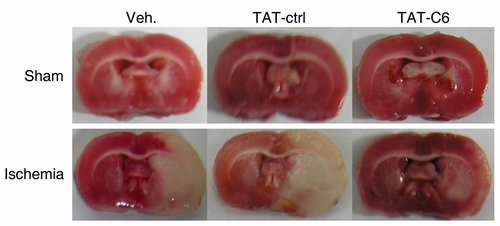Time:2010-09-03
On September 1st, 2010, a research article from the Laboratory of Neural Signal Transduction entitled "Inhibition of TRPC6 Degradation Suppresses Ischemic Brain Damage in Rats" was published in the Journal of Clinical Investigation. This work was carried out by graduate students Wanlu Du, Junbo Huang and Hailan Yao under the supervision of Dr. Yizheng Wang.
Stroke is a major cause of death and long-term disability worldwide. Acute ischemic stroke, the most common form, can produce an infarct core, in which cell death is rapid and irreversible, and a peri-infarct area, in which cell damage is delayed and rescuable. Protecting neurons the in peri-infarct area from insults is very important for ischemic stroke therapy.
The transient receptor potential canonical (TRPC) is a subfamily of non-selective cation channels permeable to Ca2+, present in many cell types, including neurons. TRPC channels have been reported to have various physiological functions. TRPC3 and TRPC6 have been found to be necessary for neuronal survival during development. Wanlu Du and colleagues found that TRPC6 was specifically downregulated in the peri-infarct area in rats suffering from focal brain ischemia. This downregulation took place prior to neuronal death and was mediated by calpain activation. They identified the calpain cleavage site on TRPC6 and designed a cell-permeable peptide containing the sequence spanning this cleavage site in TRPC6. This peptide inhibited calpain proteolysis of TRPC6, and this inhibition of TRPC6 downregulation could protect neurons and animals from ischemic insults. This report suggests a new strategy for stroke therapy and represents a new finding in the laba€?s work on the role of TRPC channels under pathological conditions.

Inhibition of calpain proteolysis of TRPC6 by the TAT-C6 peptide protected rats from ischemic brain damage.
 附件下载:
附件下载: